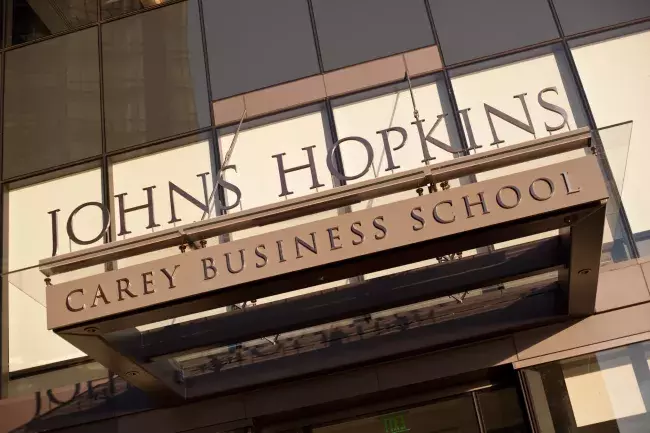Search
Alumna uses Executive Education to help transition from team member to team lead
TSI Conferences and Events
Conferences and Events

Technology and Society Initiative
Upcoming events
The following events feature faculty affiliated with the Johns Hopkins Carey Business School Technology and Society Initiative
Check back for future events
Recent events
Eighth Annual NABE Tech Economics Conference & Industry Job Fair: Tec24: Economics in the Age of Algorithms, Experiments, and AI
Julia Levine, Michael Luca, Ozge Sahin, Colleen Stuart
EmTech 2024
Michael Luca
TSI Roundtable: Technology and Cities
December 3, 2024
Recent technological advances offer cities new opportunities to enhance services, improve quality of life, and strengthen communities. Universities play a role in advancing these efforts by conducting policy relevant research, bridging research and practice, and collaborating with local governments to develop a toolkit for leveraging for the social good. The JHU Carey Technology and Society Initiative has been active in this area, partnering with companies and governments.
On December 3, the Tech and Society Initiative hosted a roundtable discussion exploring the intersection of analytics, technology, and cities. Following opening remarks by Lindsey Parker, chief of staff to DC Mayor Muriel Bowser, the conversation explored paths to leverage technology to improve city life.
TSI Roundtable: Assessing Privacy Regulations
November 19, 2024
Johns Hopkins University Bloomberg Center, 555 Pennsylvania Ave. NW, Washington, D.C. 20001
Johns Hopkins University Bloomberg Center, 555 Pennsylvania Ave. NW, Washington, D.C. 20001 As the scope and scale of data collection continue to increase, policymakers around the globe are exploring ways to balance companies’ desire to leverage consumer data with the desire of customers to understand and influence whether and how their data is being used. On November 19, the Tech and Society Initiative hosted a roundtable discussion on privacy regulations. Following opening remarks by Devesh Raval, the Deputy Director for Consumer Protection, Federal Trade Commission (FTC), and Nellie Lew, the Assistant Director for Consumer Protection, FTC on the current landscape, there was a roundtable discussion on the tradeoffs involved in different approaches to corporate and government approaches to privacy policy.
On October 8, the Tech and Society Initiative hosted a roundtable discussion on platform regulation. Following presentations by Kush Amlani, Global Competition & Regulatory Counsel at Mozilla, and Gemma Petrie, Principal Researcher at Mozilla, there was a roundtable discussion exploring potential strategies to assess and inform platform regulation.
TSI Roundtable: The Evolving Platform Regulation Landscape
October 8, 2024
Johns Hopkins University Bloomberg Center, 555 Pennsylvania Ave. NW, Washington, D.C. 20001
Major platforms continue to shape our digital experiences as a growing share of the economy moves online. In this evolving landscape, it is critical for business leaders and policymakers to assess the societal impact of platforms. This offers opportunities for platforms to create more human-centered products. Thoughtful regulation can also play a crucial role in fostering a vibrant tech ecosystem that prioritizes consumer protection, competition, and innovation.
On October 8, the Tech and Society Initiative hosted a roundtable discussion on platform regulation. Following presentations by Kush Amlani, Global Competition & Regulatory Counsel at Mozilla, and Gemma Petrie, Principal Researcher at Mozilla, there was a roundtable discussion exploring potential strategies to assess and inform platform regulation.
Panel on the Regulation of Privacy in the U.S.
September 17, 2024 | 4 - 5:30 p.m.
Johns Hopkins University Bloomberg Center, 555 Pennsylvania Ave. NW, Washington, D.C. 20001
Companies now collect, analyze, repackage, and sell extraordinary amounts of data on customers. For instance, companies now track and sell data ranging from person-level records of smart phone locations over time to what people search for online. While this offers the promise of data-driven decisions, new products, and targeted advertisements, it also heightens concerns about privacy.
Business leaders, policymakers, and researchers alike are grappling with how and when to thoughtfully approach issues of data and privacy.
On September 17, Professor Itay Fainmesser (Carey) moderated a discussion with Alessandro Bonatti (MIT), Laura Brandimorte (University of Arizona), Alejandro Rosenberg (Federal Trade Commission), and Daniel Sokol (University of Southern California) on the economics of privacy, including a discussion of recent research on privacy, as well as current and upcoming federal and states' regulations.
Courses
Three-day Executive Education course:
Leveraging AI for Business Success
January 16 - 18, 2025 | 9 a.m. - 4 p.m.
Johns Hopkins University Bloomberg center, 555 Pennsylvania ave. NW, Washington, D.C. 20001
Join this three-day executive program to learn how artificial intelligence is transforming business, and how to leverage it in your company.
Artificial intelligence and machine learning are transforming business and society at an unprecedented rate. As these technologies become central to our lives and the business ecosystem, leaders must be equipped to navigate and leverage their potential. This program is designed to help you do just that, demystifying AI and its applications.
Who should attend? This program is tailored for managers and leaders across sectors—including finance, health care, retail, and manufacturing—and functions such as product management, research and development, sales, marketing, and talent management. No prior technical knowledge is required.
What will you learn?
- Understanding AI/ML: Gain a comprehensive overview of AI and ML technologies, including predictive models and Generative AI (GenAI), and learn how they can drive business efficiency and growth.
- Becoming AI-ready: Learn how to make your organization AI-ready, including the internal structural and functional changes needed to integrate AI effectively.
- Practical applications: Explore successful AI applications and real world case studies in different industries and how they can be adapted to your organization’s needs.
- Simulations and hands-on experience: Engage with AI capabilities through interactive simulations to see real-world applications in action.
- Ethical and risk considerations: Delve into the ethical implications and risks associated with AI, and learn best practices for designing responsible AI solutions.
Why attend? This program will provide you with actionable insights and practical tools to harness AI/ML for strategic advantage. You'll come away with the knowledge to lead your team through the AI revolution, ensuring your organization not only adapts but thrives in the evolving landscape.
Deal Me In: Study on Business Cards Shows How Business Relationships Develop
The 2nd Health Care Markets Conference
The 2nd Health Care Markets Conference
May 18 -19, 2023
Harbor East, 24th floor

The 2nd Health Care Markets Conference
The health care market landscape in the United States has changed rapidly in the past several years, requiring an integrated perspective to understand the complex interaction between choices at the micro level and the shifting regulatory and institutional landscape at the macro level. This two-day conference provides a forum for industry leaders, policy analysts, and academic experts to examine how consumer and firm choices, as well as government regulation and policy, shape and transform health care markets.

Program Co-Chairs: Yaa Akosa Antwi, Andrew Ching, and Jian Ni, and of the Johns Hopkins Carey Business School
Co-Sponsors: Digital Business Development Initiative (DBDI) and Hopkins Business of Health Initiative (HBHI)

Register Now for The 2nd Health Care Markets Conference
Program
Thursday, May 18
8 – 8:45 a.m. Breakfast
8:45 – 9 a.m. Opening Remarks:
Goker Aydin, Vice-Dean, Johns Hopkins Carey Business School
9 – 10 a.m.
Health Shocks, Health Insurance, and the Dynamics of Earnings and Health
Presenter: Michael Keane (Johns Hopkins Carey Business School)
Co-author: Elena Capatina (Australian National University)
10 – 11 a.m.
Can Competitive Bidding Work in Health Care? Evidence from Medicare Durable Medical Equipment
Presenter: Yunan Ji (Georgetown University)
11 – 11:20 a.m. Break
11:20 a.m. – 12:20 p.m.
You’d be Hard to Replace: Provider Competition in Narrow Network Insurance Markets
Presenter: Samuel Kleiner (Federal Trade Commission)
Co-authors: Thomas G. Koch (Federal Trade Commission) and Christopher V. Lau (Federal Trade Commission)
12:20 – 1:30 p.m. Lunch
1:30 – 2:30 p.m.
Does Advertising Matter to Emergency Department Patients? The Effect of Advertising on Hospital Choice, Travel Distances, and Mortality Rates
Presenter: TI Kim (University of Texas at Dallas)
Co-authors: Simon Seung Mok Kim (University of Texas at Dallas) and Tae Jung (TJ) Yoon (Korean Advanced Institute of Science and Technology)
2:30 – 3:30 p.m.
Endogenous Information and Simplifying Insurance Choice
Presenter: Jihye Jeon (Boston University)
Co-author: Zach Y. Brown (University of Michigan)
3:30 – 3:50 p.m. Break
3:50 – 4:50 p.m.
Procurement in Welfare Programs: Evidence and Implications from WIC Infant Formula Contracts
Presenter: Yonghong An (Texas A&M University)
Co-authors: David Davis (South Dakota State University), Rui Huang (Amazon), Yizao Liu (Pennsylvania State University) and Ruli Xiao (Indiana University)
5:30pm – 6:30 p.m. Reception
Friday, May 19
8 – 9 a.m. Breakfast
9 – 10 a.m.
Funding of Clinical Trials and Reported Drug Efficacy
Presenter: Tamar Oostrom (Ohio State University)
10 – 11 a.m.
The Power of Exclusion: Pharmacy Networks and Bargaining in Medicare Part D
Presenter: Gautam Gowrisankaran (Columbia University)
Co-authors: Sebastian Fleitas (University of Leuven), Amanda Starc (Northwestern University), Ashley Swanson (University of Wisconsin-Madison) and Robert Town (University of Texas at Austin)
11 – 11:15 a.m. Break
11:15 a.m. – 12:15 p.m.
Does Social Media Dominate Government Report Cards in Influencing Nursing Home Demand?
Presenter: Susan Feng Lu (Purdue University)
Co-authors: Yuanchen Li (Tongji University), Lauren Lu (Dartmouth College)
12:15 p.m. Concluding Remarks and Lunch
Carey Business School makes prestigious list of “Schools to Watch” in 2024
Full time MBA: How to apply
How to apply: Full-time MBA

Admissions
The 2026 application for the Full-time MBA is now open. The 2026 application for all other programs will open later this summer.
Application requirements for the Full-time MBA program
Applying to a graduate business school can be a long process. That’s why we’ve curated our top tips to help you navigate the application and admission process. Please review the instructions below to prepare your application to the Johns Hopkins Full-time MBA program. We can’t wait for you to join Carey’s vibrant learning community and build for what’s next together.
Apply to the Full-time MBA program
Application requirements
-
Begin and manage your application by creating your username and password on the Johns Hopkins University-wide platform.
- Choose "Carey Business School" as your school of choice.
- You can begin your application, save it, and return to finish it at a later time by logging in at your convenience.
- Your application will not be evaluated until you submit it and all supporting materials are received.
- Use Google Chrome for the best user experience while completing your application.
The Carey admissions team prefers electronic documents. If you must provide a document by mail, please send to:
Office of Admissions
Johns Hopkins Carey Business School
100 International Drive
Baltimore, MD 21202
-
When choosing an application round, be sure to review our decision release dates and deposit deadlines to secure your place in the class. As a general policy, we do not offer extensions, so we recommend applying when you’re confident you’ll be ready to make your enrollment decision. International applicants are strongly encouraged to apply by the Round 2 deadline.
Fall 2026 application deadlines
Deadlines Early Action Round 1 Round 2 Round 3 Candidate deadline September 10, 2025 October 22, 2025 January 7, 2026 March 18, 2026 Decision release October 22, 2025 December 10, 2025 March 4, 2026 April 29, 2026 Deposit deadline December 3, 2025 February 18, 2026 April 15, 2026 May 27, 2026
-
Applicants must submit a total of two required essays, based on the questions listed below. It is important to express your original thoughts and incorporate your individual voice in response to these questions. We do not accept general statements of purpose or essays on topics from other applications.
Essay 1:
What are your specific post-MBA career aspirations and how will this program help you achieve your short- and long-term goals? Please be sure to comment on why now is the right time to pursue a full-time MBA and what aspects of the Johns Hopkins MBA are particularly appealing to you.
Essay 2:
Carey’s institutional values are Boundless Curiosity, Relentless Advancement, Unwavering Humanity, and Collaborative Leadership.
- Boundless Curiosity: Have a hungry mind, wired for exploration, always seeking, discovering, and innovating. Carey embraces continuous learning and a constant pursuit of knowledge.
- Relentless Advancement: Challenge the status quo. Carey builds on Johns Hopkins University’s tireless pursuit of excellence.
- Unwavering Humanity: Commit to business with humanity in mind. Carey advances society and shapes leading citizens
- Collaborative Leadership: Foster an inclusive environment. Carey builds passionate teams across the Johns Hopkins network to develop dynamic business solutions.
Which of Carey’s four values resonates most with you, and why? Please describe ways you already exemplify that value, as well as how you envision demonstrating this value in your future career.
Optional essay:
We also offer an optional essay to provide any additional clarifying information you wish to share with the Admissions committee regarding your academic record, personal history, or professional attributes. This space can also be used to address extenuating circumstances such as inconsistent or weak academic performance, gaps in work experience, or choice of recommender.
Be sure your essays capture who you are, what you believe, and what you aspire to do. In addition:
- Indicate which question you are answering at the beginning of each essay.
- Use a 12-point font and double-space your document.
- Upload both required essays to the online application.
- Essays should be 300-500 words each.
-
Official transcripts from all U.S. schools must be sent electronically. All U.S. transcripts must be from an accredited institution recognized by the Department of Education. Please visit your school’s website to request an official transcript be sent electronically to carey.admissions.transcripts@jhu.edu.
We require transcripts from all institutions where you have attempted more than 15 credits. Final transcripts must show the degrees you have earned. Your admission decision may be delayed if you do not send transcripts from all colleges/universities attended. If your transcripts are from a non-U.S. school, please review the "additional requirements for the non-U.S. applicants" section below for information about the required course-by-course credential evaluation process.
If your school does not participate in an electronic transcript submission system, please send official sealed transcripts to the address below:
Johns Hopkins Carey Business School
Office of Admissions
100 International Drive
Baltimore, MD 21202
-
We require a one-page résumé that highlights your academic background and professional experience in a clear, concise, and results-oriented format. Your résumé should be organized in reverse chronological order and include both the months and years for each position or internship.
We recommend emphasizing your quantifiable achievements, demonstrated leadership, and impact—rather than simply listing job responsibilities. Tailor your résumé for business school by showcasing contributions that reflect your potential as an MBA candidate.
Your résumé should complement, not duplicate, your essays and application. Use it to showcase the broader story of your career progression, decision-making, and readiness for graduate study.
Use clear section headings, professional font (10–12 points), and consistent formatting throughout. Be sure to proofread carefully to eliminate any spelling or grammatical errors. This is your opportunity to provide the admissions committee with a concise snapshot of who you are and the impact you’ve made—make it count.
-
We require one professional recommendation, though we will review up to two. Your recommender should be someone who knows you in a professional context and can speak directly to your strengths, impact, leadership potential, and contributions. A current or former supervisor is typically the most effective choice.
Please do not choose personal friends or family members and avoid selecting someone based solely on their title or seniority if they cannot speak meaningfully about your work. Please use your recommender’s work email address rather than a personal account like Gmail, which will be more closely monitored in our credential verification process.
Academic recommendations are generally not as helpful, especially when only one letter is submitted.
To ensure your recommender is well prepared:
- Approach them at least two months in advance of the application deadline.
- Share your résumé, career goals, and a brief overview of why you’re pursuing an MBA at Carey, so they can align their recommendation with the rest of your application.
- Discuss submission requirements and deadlines early, and ensure they submit the letter in the proper format.
Choosing the right recommender—and giving them the time and context to write a strong letter—can add significant value to your application.
Please visit Carey’s Blog to read more tips on choosing a strong reference.
-
All applicants are required to submit either GMAT or GRE scores, unless approved for a waiver. We have no preference between the two exams—choose the one that best aligns with your strengths. Test scores must be no more than five years old.
When applying, upload your scores in the “Supporting Materials” section. These are considered unofficial; you must also request that official scores be sent directly to our Admissions Office using the codes below:
- GMAT - KGB-B0-98
- GRE – 0834
We recognize that standardized tests may not always reflect an applicant’s full potential. If you believe your academic background, professional experience, and quantitative skills sufficiently demonstrate your readiness for an MBA, you may request a GMAT/GRE waiver.
To be considered for a waiver, you must meet BOTH of the conditions outlined in the Supporting Materials section of the application. Please note:
- Requesting a waiver does not guarantee approval.
- Receiving a waiver does not guarantee admission.
- If your undergraduate degree was earned outside the U.S., a minimum 3.0 GPA must be verified through a credential evaluation (CBC) before a waiver can be granted.
We encourage you to carefully assess whether submitting test scores or pursuing a waiver will present you as the strongest possible candidate. Our admissions team takes a holistic approach, considering all elements of your application, including academic performance, professional achievements, and quantitative aptitude.
For more information, use the links below.
For JD/MBA applicants: submit your LSAT score in lieu of the GMAT or GRE.
READ: DOES USING THE GMAT/GRE WAIVER HELP OR HURT MY APPLICATION?
-
Interviews are granted on an invitation-only basis after the initial evaluation of a submitted application. The interview will be approximately 45 – 60 minutes in length and serves to be both evaluative and informational. The interview will begin with a series of questions based on your application, which is an opportunity for us to gain deeper insight into your background, experiences, and interest in the Johns Hopkins MBA program. There will be a portion of time reserved for you to ask any questions you may have, so please come prepared with thoughtful questions.
We look for applicants who are energetic, engaging, and can articulate their stories, and speak to how the Johns Hopkins MBA will position them for what’s next. Answer questions honestly, not with the answer you think the interviewer wants to hear. Do not memorize answers for expected interview questions. Be yourself.
Interviews are offered in-person on our campus, via Zoom, and when possible, in other cities around the world. We work with each candidate individually to schedule. The modality of your interview will not impact the outcome. You will hear if you are receiving an invitation to interview within two weeks of the application deadline for your round.
Quick tips:
- Interviews are conducted in English.
- Dress professionally, as you would for a job interview.
- Bring a one-page resume with you to in-person interviews.
- Test your camera and microphone ahead of time for Zoom interviews
- Arrive early or join the virtual meeting a few minutes before the scheduled time.
-
A non-refundable $100 application fee is required at the time of submission. Please note that we cannot begin reviewing your application until the fee has been received.
-
In addition to the materials required for all applicants, international candidates must fulfill the following requirements:
English Language Proficiency
Applicants whose first/primary language is not English must demonstrate proficiency in both written and spoken English. To do so, you must submit official scores from one of the following accepted tests:- TOEFL iBT (we do not accept TOEFL Essentials)
- IELTS Academic
- Pearson Test of English (PTE Academic)
- Duolingo English Test (DET)
You may be eligible for a waiver if you meet specific criteria. Please review the full waiver policy on our International Applicants page.
Course by Course Credit Evaluation
If you earned or are currently pursuing a degree from an institution outside the United States, you must submit an official course-by-course evaluation from a NACES-approved agency. The evaluation must confirm:
- The degree is equivalent to a U.S. bachelor's degree
- A course-by-course breakdown
- A GPA on a 4.0 scale (if available)
If your coursework was completed outside the U.S. but your degree was awarded by a U.S. institution, you only need to submit official transcripts from all institutions attended. All transcripts must be in English.
For complete details and resources, visit our International Applicants page.
Admissions policies
Work experience is not required in order to be accepted into the program, but candidates with at least two years of full-time, post-bachelor’s work experience are most competitive. Work experience is required to be eligible for a GRE or GMAT exam waiver.
Candidates cannot apply for more than one program in a single round. If offered admission, you must accept or decline by the deadline for that round. You cannot wait to make a decision on a first offer while applying for another program in the next round.
Admission to other schools in the University
Each school at Johns Hopkins University has an independent Office of Admissions and its own application process. You must apply separately to programs housed within separate schools, although some established dual degree programs only require a single application. If you are interested in a dual degree program, please visit our dual degree page for special instructions on how to apply.
Current Carey Business School students who wish to enter a degree program at one of the other schools in the university must submit an admission application to that school. Admission to the Carey Business School establishes no claim or priority for admission to any other school in the university.
Questions?
Contact the Admissions team if you have additional questions or need more information to complete your Carey Business School application.
Finding, Hiring, and Working With Your Teaching Assistant
Finding, Hiring, and Working with Your Teaching Assistant

Teaching & Learning
Finding and hiring a teaching assistant
Verify your eligibility for a teaching assistant (TA)
Review "Eligibility requirements to request TA support" on the Employing Students webpage on Inside Carey.
Finding a TA
OPTION A: Invite one of your top students to be a TA. If they are interested, proceed to the next section to verify eligibility.
OPTION B: Enlist the help of Carey.TA. In your email, please include the course and term and any prerequisites (e.g., the student must have taken the course, received a specific grade, and/or has relevant work experience).
OPTION C: Post an advertisement on SMILE, a Johns Hopkins platform for student hiring and experiential learning managed by the university.
- Select Employers on the SMILE homepage and login with your JHED ID.
- Select which type of position you would like to post (paid campus internship or student job).
- Specify the details of the position (description, pay rate, hours per week, work location, open to undergrads/grads/both, etc.).
- Submit your position (positions will be reviewed and approved within 48 hours).
Initiate the hiring process
Once you have identified a TA, begin the hiring process by completing the online request form. Please allow 2 to 3 weeks for processing. As a reminder, your TA cannot begin work until you receive an email from HR confirming eligibility and providing a hiring confirmation.
Train your TA
If you hire a first-time TA, or if your TA would benefit from a refresher, email Carey.TA to request that they be enrolled into the TA Resources site in Canvas. This site contains several resources for TA-specific tasks. You are also encouraged to invite your TA(s) to pre-term Canvas training or any offered trainings for faculty.
Training recommendations
- Based on your needs, discuss the TA’s level of skill. Contact Carey.TA for Just-In-Time Training.
- Define your expectations.
- Review the elements of the course and syllabus together to determine what needs to be done and when.
See more information in the section "Working With Your TA."
Be available for questions
Set up a weekly meeting time for review.
Working with your teaching assistant
When you hire a TA, you become an employee supervisor. The following information will help you develop your communication plan and classroom management strategy to get the most out of your TA. TAs cannot work more than 20 hours per week in total.
General information
Training your TA in Canvas
Your TA might be new to Canvas and therefore need initial training. Teaching & Learning's Canvas team will work with your TA to train them in the LMS. Once your course is available in the SIS section (prior to the course going live for students), please reach out to Carey.TA to request arrangements for Canvas training.
In your email, please include the name of the course, the name of the TA, the TA's email address, and the TA's role and identify any other technical training they might need for your classroom (e.g., proctoring software, Pearson, iDecisionGames, Microsoft Teams).
If your TA does not need training, please follow these steps to set them up in your course:
- Navigate to your course menu and locate People.
- After you have selected People, you will see a +People button on the right side of the screen.
- Choose Add User by SIS ID. At JHU, this is our JHED ID.
- Enter the JHED ID (e.g., flast1) in the Email Address (required) field. You need only to enter the JHED.
- Choose the appropriate role (e.g., TA).
- Select Next.
- Choose Add Users to complete the process.
Communications
Once you have hired your TA, please make time to review with them your expectations regarding the following areas: timesheets and time tracking, feedback, meetings, tutoring, office hours, grading, accessibility, attendance, monitoring Q&A discussions or Zoom chats, and Canvas calendar.
Schedule regular communication meetings throughout the term. Here are some meeting suggestions:
Kick-off meeting
- Exchange contact information exchange and determine response times.
- Identify acceptable methods of contact (e.g., email, text, phone call, Microsoft Teams, Slack, WhatsApp).
- Give an overview of the purpose of class/learning objectives.
- Classroom ethics
- Grading Approach: Will you use anonymous grading?
- Academic Integrity: Will Turnitin be reviewed by your TA? What guidelines do you want your TA to follow?
- Tutoring Parameters: Can your TA assist with homework assignments?
- Roles in the classroom
- Prior to the course start, TA(s) can do the following:
- Review and QA the Canvas site
- Review for clarity and grammar
- Using Student View, check the links and make sure all sections are visible
- Post announcements and set up groups
- Answer Canvas-related questions
- Answer content-related questions
- Assist in the Zoom classroom
- Learn and assist with other classroom applications
- Prior to the course start, TA(s) can do the following:
- Grade and provide feedback (Note: TAs cannot grade Assurance of Learning assignments)
- Determine timelines/deadlines (Note: Please see our Classroom Management document)
- Schedule tutoring sessions or office hours (if applicable)
- Review learning tools and technology
Touch-base meetings (weekly)
- Review any issues (e.g., Canvas, technical, student)
- Reconfirm tasks for the next week (e.g., announcement posts, publishing content for student view, monitoring participation, sharing answer keys for grading)
- Review Q&A from students
- Keep notes on changes/improvements/suggestions for the next iteration of the course
Course debrief meeting
- Review and update notes for the next iteration of the course to share with the course lead and/or Teaching & Learning
- Gather feedback from your TA on their experience
- Consider inviting TA back for the next course offering
Resources
Here are some tools that you can use and share with your TA:
- Faculty-TA Initial Calibration: a checklist of important topics to review
- Classroom Management Template : a spreadsheet that outlines assignment due dates, expected grading completion, and classroom tasks
- Zoom Class Session Checklist
- Canvas Course Role Permissions Guide
- Canvas FAQ
Timesheets and approvals for your TA
As the supervisor, you will need to review and approve timesheets for your TA(s) weekly. For a more efficient review process, please ask your employees to record hours worked and task(s) completed on their timesheet. Carey uses two online timekeeping applications for recording and approval of TA working hours: TimesheetX and Harvest. TimesheetX is used for all current student employees at Johns Hopkins University. Harvest is used for TAs who are casual employees.
General information
The workweek is defined as Monday through Sunday. TAs should submit their hours by Sunday of each work week. As their supervisor, you will review/approve timesheets no later than noon on the following Monday.
There is no sick, vacation, or holiday pay for student or casual TAs.
Pay is issued on or about the 15th and 30th of the month.
TAs cannot work more than 20 hours per week in total. As a reminder, your TA might be working for more than one supervisor.
Resources
TimesheetX (you might have to login with your JHED to access)